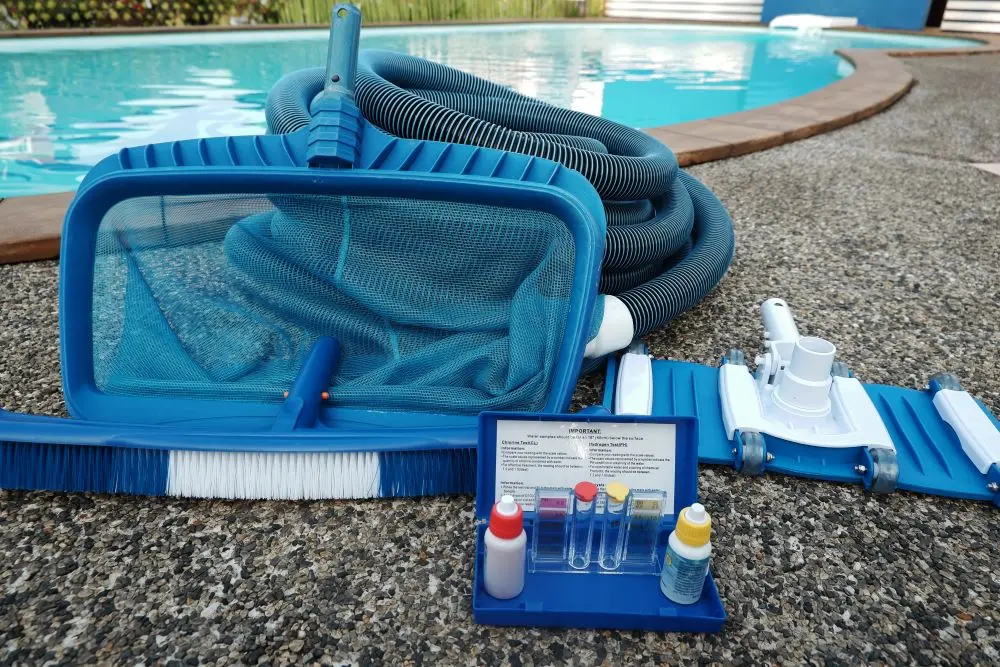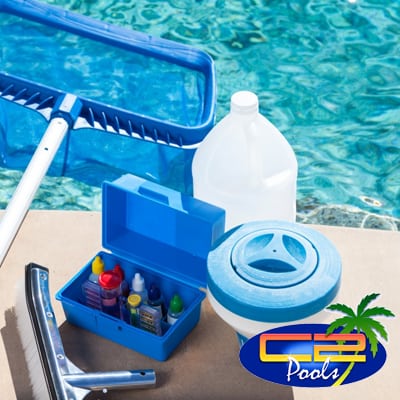Necessary Swimming Pool Maintenance Tips to Keep Your Water Sparkling Clean
Maintaining a beautiful swimming pool requires a systematic technique to water treatment and sanitation, which eventually contributes to both the visual appeal and long life of the pool itself. Adhering to these fundamental methods not only enhances the quality of your pool water however also safeguards against prospective issues that might escalate right into costly fixings.
Examination Water Chemistry Consistently
To make sure a safe and enjoyable swimming experience, on a regular basis checking water chemistry is important. Correct water balance not just boosts swimmer convenience but also protects pool devices and surfaces. The primary chemical specifications to keep track of include pH, chlorine degrees, alkalinity, and calcium firmness.
pH degrees ought to be kept in between 7.2 and 7.8, as this range minimizes skin and eye inflammation while maximizing chlorine effectiveness. Chlorine levels ought to ideally be in between 1-3 parts per million (ppm) to give ample cleanliness without triggering unpleasant odors or irritation. Overall alkalinity, which serves as a barrier for pH, ought to be kept in between 80-120 ppm to maintain water chemistry and avoid changes.

Maintain the Pool Filter Clean
Keeping correct water chemistry is just component of reliable swimming pool treatment; maintaining the swimming pool filter clean is similarly crucial for optimum performance. The pool filter plays a crucial duty in removing particles, dust, and pollutants from the water, ensuring a safe and satisfying swimming atmosphere. With time, filters can become obstructed with bits, which can dramatically minimize their efficiency.

In addition, keep track of the stress gauge on your filter system. A pressure boost of 8-10 psi over the regular operating array usually suggests that it's time for cleansing. Disregarding to keep a clean filter can lead to inadequate water circulation, out of balance chemistry, and boosted pressure on the swimming pool pump, ultimately causing greater energy expenses and prospective tools failing.
Skim and Brush Frequently

Cleaning the swimming pool walls and floor is similarly crucial. It aids remove algae, dust, and various other impurities that may hold on to surfaces. This job should be done at the very least when a week, concentrating on areas with bad blood circulation, such as steps and edges - Pool Inspection. Utilize a swimming pool brush with an appropriate bristle type for your pool surface-- nylon brushes for vinyl or fiberglass pools, and stainless-steel for plaster or floor tile surfaces.
Maintain Correct Water Levels
Keeping the swimming pool Pool Repair surface area clean with constant skimming and brushing significantly contributes to total water quality, but keeping correct water levels is equally crucial for ideal swimming pool wellness. The water degree in your swimming pool should ideally be at the axis of the skimmer opening. This makes certain that your skimmer can efficiently remove particles and floating contaminants, avoiding accumulation that can compromise water quality and high quality.
Low tide degrees can lead to pump damages, as the pump might run dry, taking the chance of expensive fixings. Conversely, exceedingly high water degrees can trigger water to overflow, diluting chemical balances and creating an unattractive mess. Frequently check your swimming pool's water degree, specifically after hefty rainfall or substantial evaporation because of heat.
Furthermore, take into consideration aspects such as swimming pool usage, ecological problems, and the kind of water features in your pool, as these can influence water levels. If you discover on your own regularly fighting rising and falling water degrees, installing a pool cover can help in reducing evaporation and preserve a steady level. Ultimately, routine tracking and adjustment of water levels will aid make sure a healthy and balanced swimming setting and lengthen the life of your swimming pool devices.
Schedule Seasonal Upkeep
Comprehending the significance of seasonal upkeep is vital for guaranteeing your swimming pool stays in optimum problem year-round. Each season brings special challenges and problems that can affect the water top quality and structural integrity of your pool. By scheduling upkeep jobs frequently, you can prevent small issues from intensifying right into expensive repairs.
In the spring, concentrate on opening up the pool, inspecting the purification system, and balancing the chemical levels. This establishes a solid structure for the swimming period - Pool Inspection. As summer approaches, regular upkeep such as skimming debris, cleaning surfaces, and surveillance water levels comes to be vital to maintain cleanliness and safety and security
As loss shows up, plan for cooler temperatures by getting rid of leaves and debris, and think about winterizing your pool if it will not be used during the chillier months. This includes decreasing water levels and including winterizing chemicals to safeguard against cold.
Throughout the winter months, regular checks on the swimming pool cover and devices are vital to make certain every little thing stays undamaged. By adhering to a seasonal maintenance schedule, you can expand the life of your pool and maintain it welcoming and safe for usage year-round.
Final Thought
Routine pool upkeep is crucial for making certain water clarity and security. By constantly checking water chemistry, maintaining the pool filter in ideal condition, and executing routine skimming and cleaning, pool proprietors can successfully avoid algae development and other concerns.
By keeping correct water chemistry, swimming pool proprietors can make certain a risk-free atmosphere, prolong devices life, and improve general satisfaction of their swimming pool.
Preserving appropriate water chemistry is just component of effective pool treatment; maintaining the swimming pool filter tidy is equally essential for optimal performance. Utilize a swimming pool brush with an ideal bristle kind for your swimming pool surface-- nylon brushes for vinyl or fiberglass swimming pools, and stainless steel for plaster or floor tile surfaces.
Maintaining the pool surface clean via constant skimming and brushing dramatically contributes to overall water quality, but keeping proper water levels is similarly essential for optimum swimming pool wellness.In addition, think about variables such as pool use, environmental conditions, and the kind of water attributes in your swimming pool, as these can influence water levels.